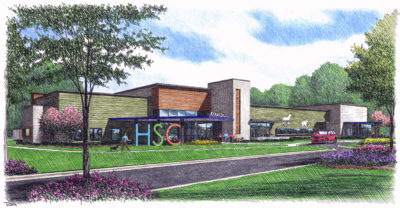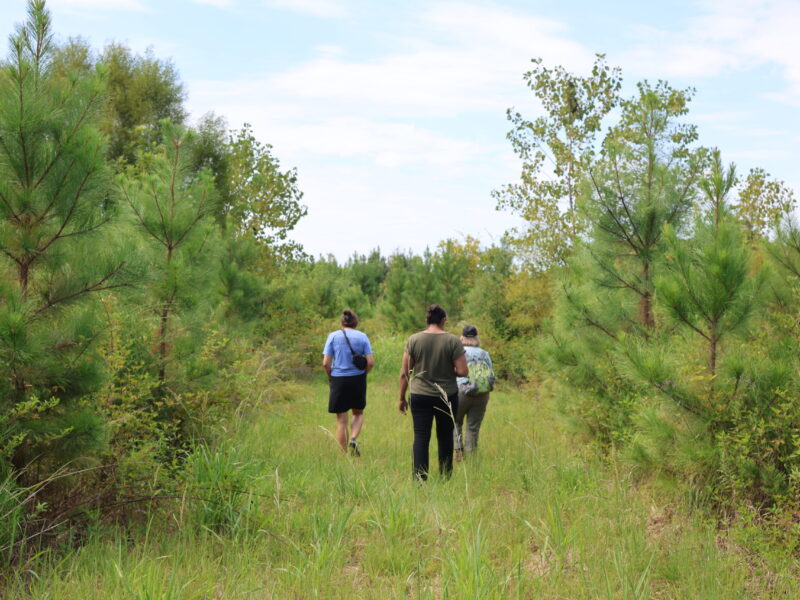
Beyond What He Could Have Imagined
How George Patterson’s Animal Welfare Fund Has Endured and Evolved
George Patterson loved his cat, Baby Jane, so much that he created an altar in her memory after she died. The Charlotte real estate developer loved cats and was concerned about overpopulation.
George’s only child, Sally Patterson, also had a fondness for animals, although hers extended beyond cats. She loved dogs – particularly her childhood pet, Prince – and developed an affection for wild animals, too. She took trips abroad, many to Africa, and always returned with photos she’d taken of creatures she encountered there, especially gorillas. While living in New York as an adult, she had three cats – Timothy, Beardsley and Zoi Foster.
George died in 1994, and Sally followed in 1999, but George’s will ensured that his love of cats – and his desire to help curtail the feral cat population – would long outlive him.
The George D. Patterson Family Fund was established at Foundation For The Carolinas in 2001. The fund, which honors the memory of George and Sally, benefits nonprofits that address animal welfare needs in the Charlotte region and beyond. Funded by assets from their estates, it was set up as a field of interest fund that supports a chosen cause area – such as the arts, environment or, in this case, animal welfare – that is meaningful to the donor. Grants are issued, typically, by a committee to various nonprofits working in the selected cause area.
Morry Johnston, George’s long-time friend and attorney, helped him draft his will. Since George’s wife pre-deceased him, George left half his estate to establish the Patterson Fund and the other half to a trust for Sally that ultimately went to the fund, as well.
Creating a Field of Interest Fund
When he passed, George left a generous $1 million gift to the Humane Society of Charlotte. He wished for the remainder of his estate to be granted out over time to various animal causes. However, when making these estate plans, Johnston and George needed help setting up a structure for this future grantmaking.
Johnston played a pivotal role selecting the philanthropic partner that would both ensure charitable intent was honored for the life of the fund and maximize grantmaking impact.
“So, of course, we asked for Foundation For The Carolinas’ help,” he said. “With (FFTC Executive Vice President) Holly Welch Stubbing’s guidance, we drew up the provisions for establishing the George D. Patterson Family Fund and asked the Foundation to help administer it. Their expertise has been beyond belief.”
The overbreeding of cats weighed heavily on George, Johnston said. Spay/neuter was his – excuse the pun – pet project. However, in part due to his foresight, the feral feline population in Mecklenburg County has decreased. In 2012, Charlotte-Mecklenburg Animal Care & Control took in 6,864 felines; that number has been on the decline since, falling to less than 3,000 in 2021.
Now the fund he established can take on new challenges – ones George couldn’t have foreseen.
“Field of interest funds are a great vehicle because they allow donors to address evolving needs and meet current demands,” said Whitney Feld, FFTC’s Vice President of Philanthropic Advancement. “Typically, our field of interest funds are endowed to support a donor’s charitable interests in perpetuity. However, the Patterson Fund is not, and although the committee treats the fund as a long-term grantmaking program, they have retained the flexibility to grant the full balance should future circumstances warrant such extraordinary generosity.”
The fund has expanded to include donations from others who care about animal welfare. Due to investment growth as well as contributions, Johnston proudly noted the fund has made grants in excess of the amount originally contributed, with a balance that surpasses the original contribution.
Managing the Annual Grantmaking Process
Over the past two decades, the Patterson Fund has been managed by FFTC and an advisory committee. The initial advisory committee members included attorney Johnston; Adele Hagood, Sally’s best childhood friend; and Susan Fenton, another close friend.

Thanks to a $1 million gift from the Patterson Fund, the lobby and the wellness clinic at the new Humane Society of Charlotte facility will be named in honor of George.
The Foundation coordinates an annual process inviting nonprofit organizations to submit grant applications for the Patterson Fund Committee’s review; between $150,000 and $200,000 in grants are typically funded each year. Grants are focused on several areas: community outreach; educational programs; fostering or adoption programs; affordable spay/neuter services; advocacy for cruelty prevention and reducing pet overpopulation; and collaboration with local animal control shelters to reduce the number of animals being euthanized.
Since its inception, the Patterson Fund has awarded more than $3 million in grants (as of April 2022). The largest was a $1 million commitment toward the new home for the Humane Society of Charlotte, set to open this spring.
At approximately 26,000 square feet, the new Humane Society of Charlotte facility will allow the staff, previously spread out among four different locations, to be united under one roof. With adoption programs, clinic services activities (spay/neuter services and wellness clinic) and outreach efforts – including pet food bank program – HSC expects to serve more than 30,000 animals annually.
Major enhancements that HSC does not have in its current space include a climate-controlled indoor facility, community spaces such as the cat café and public dog park, an education center, and more. Thanks to the support from the Patterson Fund, the lobby and the wellness clinic at the new facility will be named in honor of George.
Other recent grants have included:
- Funding a trap-and-release program to prevent the feral cat population from overbreeding. And, in a separate grant, funding and training to allow public animal shelters to reduce their kill rates.
- Assisting HERD Rescue, a Tryon, N.C.-based group that saves equine animals from dire conditions, including slaughter.
- Encouraging students to learn the importance of promoting animal welfare, through a $10,000 challenge for Myers Park High School students to identify organizations helping animals and provide awards to the groups.
Giving a Gift That Endures
As time passes, the landscape of charitable needs and opportunities inevitably shifts. For example, Katie Tyler – a member of the Patterson Fund advisory committee and prominent Charlotte animal welfare advocate – noted what might have happened if a donor had established a fund decades ago to support orphanages.
“Orphanages don’t really exist anymore, but homeless children are an urgent societal issue,” she said. “A field of interest fund keeps the donor’s money where it was intended but allows it to help with the times’ most pressing problems.”

A long-time member of the Patterson Fund advisory committee, Katie Tyler has been an animal welfare advocate all of her life.
As a child, Tyler sometimes gave a portion of her allowance to feed stray animals. Having seen first-hand the power of working closely with FFTC, Tyler has already designated her own planned gift to support the causes closest to her heart: reducing euthanasia, eliminating abuse and neglect, keeping companion animals with those who love them and providing “Good Samaritan” funds for veterinarians to cover costs pet owners cannot afford.
She and the other Patterson Fund Committee members endeavor to be faithful custodians, carefully honoring donor intent. Johnston said the committee works to ensure grantees have sustainable operational and funding models.
“We do site visits,” Tyler said. “We’re very curious about the organizations’ stewardship of our funds. We ask for mid-term reports and impact reports. Most of our recipients are multi-year recipients. We want to build relationships with these people.”
Leveraging Expertise in Animal Welfare
As a result of the prowess of the Patterson Fund Committee, FFTC allows them to oversee other endowments that deal with animal welfare. For example, the committee advises on the annual spendable amount from the Ross Endowment for Animal Care, guiding donations that honor the intent of Ellen Ross, an FFTC donor who passed away in 2007.
The committee’s experience has turned them into experts regarding animal welfare organizations throughout a multi-county region surrounding Charlotte. Many grantees appreciate the group’s deep knowledge.
For nearly 15 years, Donna Stucker has worked with the committee in her role as chief philanthropy officer of the Humane Society of Charlotte. “We have a personal relationship with the committee members; we are able to reach out to them directly with ideas or questions, or to seek advice,” she said. “Sometimes with large foundations you can’t have access necessarily to the people who are really behind the foundation and making the decision. But having that access has been invaluable to us.”
Feld said FFTC has planned estate gifts estimated at more than $30 million from donors who want the Foundation to provide stewardship over funds to promote animal welfare. In fact, animal welfare is so essential to FFTC donors and the region that it was designated as one of FFTC’s eight Community Impact Funds. The Foundation’s existing platform allows donors to leave specific guidelines as to how funds should be awarded, while leveraging the Patterson Committee and staff expertise for amplified impact.
Johnston said George was a developer who understood the power of money, but he believes his friend could never have imagined how much good would result from his benevolent gift.
“What George has done demonstrates the effectiveness when you look at the long-term value of gifting and how that can accomplish so much more than a one-shot donation,” Johnston said. “And, so, I hope it will encourage others to say, ‘I really can make a difference.’ Because of his determination, really, we can say that very positive things have not only happened but will continue happening.”




